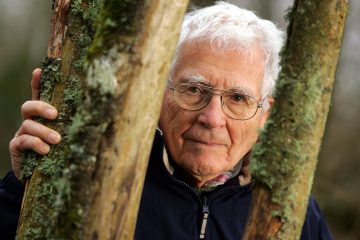Venture into the intriguing world of James Lovelock, a visionary thinker whose ideas have reshaped our understanding of the intricate web of life on Earth. Delve into the depths of his vast reservoir of information, where each piece of knowledge acts as a building block in the mosaic of our planet’s ecosystem. Join us on a journey that unveils the enigmatic realms of Lovelock’s profound insights and illuminates the path to a deeper connection with the natural world.
Table of Contents
- Exploring the Life and Work of James Lovelock
- Revolutionizing Environmental Science: The Gaia Hypothesis
- Insights into Lovelock’s Innovative Technologies and Solutions
- Recommendations for Applying Lovelock’s Ideas in Modern Society
- Q&A
- Wrapping Up
Exploring the Life and Work of James Lovelock
James Lovelock, a pioneering scientist known for his groundbreaking work in environmental science, has dedicated his life to studying the intricate relationships between Earth and its ecosystems. With a career spanning decades, Lovelock has made significant contributions to the field of climatology and sustainability through his innovative ideas and research.
Lovelock’s concept of the Gaia hypothesis, which suggests that Earth functions as a self-regulating organism, has revolutionized our understanding of the planet’s complex systems. His work highlights the interconnectedness of all living organisms and their environment, emphasizing the importance of preserving balance and harmony for the well-being of our planet. Through his writings, lectures, and research, Lovelock continues to inspire new generations of scientists and environmentalists to explore ways to protect and nurture our Earth for future generations.
Revolutionizing Environmental Science: The Gaia Hypothesis
James Lovelock’s Gaia hypothesis presents a groundbreaking perspective in the realm of environmental science. This theory suggests that the Earth functions as a self-regulating organism, where living organisms interact with the inorganic elements of the planet to maintain conditions suitable for life. It proposes that Earth itself is a complex system that strives to sustain life through various processes.
Through the Gaia hypothesis, Lovelock challenges traditional views of the Earth as a simple collection of separate entities. Instead, he portrays our planet as a cohesive, dynamic entity capable of regulating its environment. This theory emphasizes the interconnectedness of all living and non-living components on Earth, highlighting the importance of understanding ecosystems as a whole rather than individual parts.

Insights into Lovelock’s Innovative Technologies and Solutions
Exploring the realm of James Lovelock’s groundbreaking technologies unveils a world of innovation and sustainability. His visionary approach to addressing environmental challenges through cutting-edge solutions is truly inspiring. Lovelock’s work delves into the intersection of science and creativity, leading to the development of solutions that transcend conventional boundaries.
<p>By delving into Lovelock's creations, one can witness a fusion of brilliant ideas and practical applications designed to drive positive change. From atmospheric monitoring systems to revolutionary energy solutions, Lovelock's contributions have reshaped our understanding of environmental sustainability. Embracing his ethos of harmony between nature and technology opens up a realm of possibilities for a greener, more sustainable future.</p>
Recommendations for Applying Lovelock’s Ideas in Modern Society
When considering the applicability of James Lovelock’s ideas in today’s world, it’s essential to reflect on the interconnectedness between humanity and the environment. Embracing the Gaia theory, which views Earth as a self-regulating organism, can inspire sustainable practices and foster a deeper respect for our planet.
- Embrace Sustainable Technologies: Incorporating renewable energy sources like solar and wind power aligns with Lovelock’s vision of harnessing natural resources responsibly.
- Promote Biodiversity: Preserving ecosystems and supporting diverse plant and animal life contributes to the stability and health of the planet, echoing Lovelock’s emphasis on the importance of biological diversity.
Furthermore, fostering a mindset that values the delicate balance between human activities and Earth’s systems is key in applying Lovelock’s principles effectively. Encouraging mindful consumption patterns, advocating for environmental protection policies, and promoting global cooperation are steps towards creating a harmonious relationship between society and nature.
- Cultivate Environmental Awareness: Educating communities and individuals about environmental issues can drive positive change and instill a sense of responsibility towards preserving the Earth’s ecosystems.
- Foster Cross-Sector Collaboration: Facilitating partnerships between governments, businesses, and communities can lead to innovative solutions that benefit both society and the environment, aligning with Lovelock’s holistic view of planetary health.
Q&A
**Q&A: Exploring the World of James Lovelock**
Q: Who is James Lovelock and why is he significant?
A: James Lovelock is a renowned independent scientist, environmentalist, and futurist best known for proposing the Gaia hypothesis, which suggests that Earth is a self-regulating system. His work has revolutionized the way we perceive our planet and its interconnected systems.
Q: What are some key contributions of James Lovelock to the field of environmental science?
A: James Lovelock’s groundbreaking work extends beyond the Gaia hypothesis. He also developed the Electron Capture Detector, a crucial tool for detecting pollutants in the environment. His insights have shaped modern environmental science and inspired new approaches to sustainability.
Q: How has James Lovelock’s Gaia hypothesis influenced our understanding of Earth’s ecosystems?
A: The Gaia hypothesis proposes that Earth functions as a single, self-regulating organism, where living organisms and the environment interact to maintain conditions suitable for life. This perspective has sparked debates and shaped research in fields like ecology, biology, and climate science.
Q: What is James Lovelock’s stance on climate change and its impact on the planet?
A: James Lovelock acknowledges the severity of climate change and its potential consequences for Earth. He advocates for urgent action to mitigate its effects, emphasizing the importance of shifting towards sustainable practices to preserve our planet for future generations.
Q: How can James Lovelock’s work inspire individuals to take action towards a more sustainable future?
A: By promoting a holistic view of Earth and highlighting the delicate balance of its systems, James Lovelock encourages us to rethink our relationship with the environment. His ideas underscore the importance of individual and collective efforts in creating a greener, more sustainable world.
Wrapping Up
As we conclude our exploration into the fascinating world of James Lovelock and his groundbreaking information, we are reminded of the profound impact one visionary thinker can have on our understanding of the world around us. From the Gaia hypothesis to his deep insights into climate science, Lovelock’s work continues to inspire and challenge us to think beyond conventional boundaries. Let us carry forward his spirit of curiosity and innovation, delving deeper into the interconnectedness of nature and the intricate web of life on our planet. Thank you for joining us on this enlightening journey through the realm of James Lovelock’s information.



0 Comments